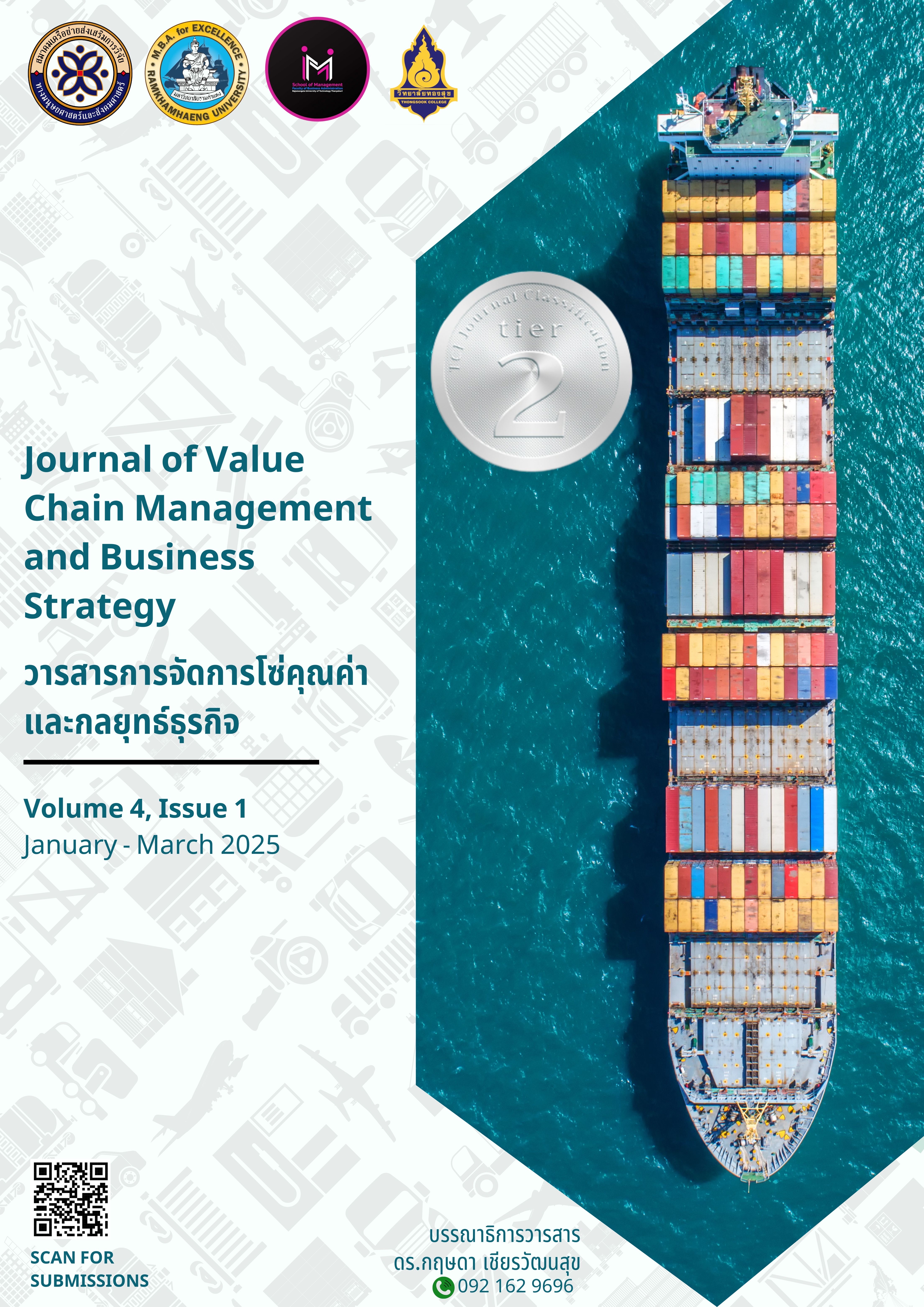การปรับตัวของพนักงานในยุคการปฏิวัติดิจิทัลสีเขียว: โอกาส ความท้าทาย และกลยุทธ์
คำสำคัญ:
การปรับตัวของพนักงาน, การปฏิวัติดิจิทัลสีเขียว, ความยั่งยืน, การพัฒนาทักษะ, การจัดการการเปลี่ยนแปลงบทคัดย่อ
บทความนี้มีวัตถุประสงค์เพื่อนำเสนอโอกาส ความท้าทาย และกลยุทธ์ในการเสริมสร้างการปรับตัวของพนักงานในยุคของการปฏิวัติดิจิทัลสีเขียว การปฏิวัติดิจิทัลสีเขียวเป็นการบูรณาการระหว่างความก้าวหน้าทางเทคโนโลยีดิจิทัลกับแนวทางการพัฒนาอย่างยั่งยืนด้านสิ่งแวดล้อม การเปลี่ยนแปลงดังกล่าวส่งผลกระทบต่อองค์การทั้งในด้านการดำเนินงานและการบริหารทรัพยากรมนุษย์ โดยเฉพาะพนักงานที่ต้องเผชิญกับการเปลี่ยนแปลงอย่างรวดเร็วจึงจำเป็นต้องพัฒนาทักษะดิจิทัลและทักษะสีเขียว เพื่อให้มีความพร้อมในการปรับตัวเข้ากับยุคการปฏิวัติดิจิทัลสีเขียว ซึ่งโอกาสของการปฏิวัติครั้งนี้ ได้แก่ การสร้างงานใหม่ การเพิ่มประสิทธิภาพการทำงาน และการสนับสนุนการเติบโตอย่างยั่งยืน ในขณะที่ความท้าทายที่สำคัญ คือ การปรับตัวของพนักงานต่อการเปลี่ยนแปลงอย่างรวดเร็ว การขาดทักษะที่จำเป็น และความต้านทานต่อการเปลี่ยนแปลง ดังนั้นการขับเคลื่อนเพื่อการเปลี่ยนผ่านนี้ให้เกิดประสิทธิภาพได้นั้น องค์การควรดำเนินกลยุทธ์ที่หลากหลาย เช่น การฝึกอบรมและพัฒนาทักษะ การส่งเสริมวัฒนธรรมการเรียนรู้อย่างต่อเนื่อง การบริหารการเปลี่ยนแปลงอย่างมีประสิทธิภาพ การสนับสนุนความเป็นอยู่และความยืดหยุ่นในการทำงาน รวมถึงการพัฒนาภาวะผู้นำ การจัดการความรู้ และการสร้างเครือข่ายความร่วมมือกับพันธมิตรภายนอก กลยุทธ์เหล่านี้มีบทบาทสำคัญในการสนับสนุนการปรับตัวของพนักงานทั้งในระดับบุคคลและระดับองค์การ เพื่อมุ่งสู่การเปลี่ยนผ่านอย่างยั่งยืนในระยะยาว
เอกสารอ้างอิง
จันทร์จิรา เหลาราช. (2564). การปรับเปลี่ยนสู่ดิจิทัลและผลกระทบต่อองค์การ. มนุษยศาสตร์สาร, 22(1), 227-240.
นพฤทธิ์ จิตรสายธาร. (2560). ความหวังใหม่ของคนไทยกับยุทธศาสตร์ชาติ 20 ปี. วารสาร มจร อุบลปริทรรศน์, 2(3), 141-154.
ยูนิลีเวอร์ ประเทศไทย. (2567). ยูนิลีเวอร์ต่อยอดนวัตกรรมทางสังคมจากเวที GCNT FORUM 2023. https://www.unilever.co.th/news/2024/gcnt-forum-2023/?utm_source=chatgpt.com
Baral, A. K. (2024). Sustainable practices in conformity assessment. In Handbook of Quality System, Accreditation and Conformity Assessment (pp. 333-370). Springer Nature Singapore.
Binci, D., Palozzi, G., & Scafarto, F. (2022). Toward digital transformation in healthcare: a framework for remote monitoring adoption. The TQM Journal, 34(6), 1772-1799. https://dx.doi.org/10.1108/TQM-04-2021-0109
Calarco, A., & Gurvis, J. (2006). Adaptability: Responding effectively to change. Center for creative leadership.
Carley, M., & Christie, I. (2017). Managing sustainable development. Routledge.
Chanana, N., & Singh, M. Y. (2024). Socio-economic relevance in science, social science, and commerce toward sustainability. Jyotikiran Publication Pune.
Cocu, A., Pecheanu, E., Susnea, I., Dingli, S., Istrate, A., & Tudorie, C. (2025). Technology-enabled learning for green and sustainable entrepreneurship education. Administrative Sciences, 15(2), 45. https://doi.org/10.3390/admsci15020045
Colglazier, W. (2015). Sustainable development agenda: 2030. Science, 349(6252), 1048-1050. https://doi.org/10.1126/science.aad2333
Dyer, H. C. (2017). Green theory. In McGlinchey, S, Walters, R and Scheinpflug, C, (eds.) International relations theory. E-International Relations , Bristol, England (pp. 84-90). White Rose University consortium.
Grass, A., Backmann, J., & Hoegl, M. (2020). From empowerment dynamics to team adaptability: Exploring and conceptualizing the continuous agile team innovation process. Journal of Product Innovation Management, 37(4), 324-351. https://doi.org/10.1111/jpim.12525
Humphreys, C. (2023). Part 1: Future skills?. https://www.linkedin.com/pulse/future-skills-colin-humphreys-0pgee
ILO. (2019). Skills for a Greener Future: Key Findings. https://www.ilo.org/publications/skills-greener-future-key-findings
Karuppannan, R. (2012). Training and development: A study of employees’ attitude on training in Vellore district cooperative bank [Unpublished doctoral dissertation]. Alagappa University.
Loiseau, E., Saikku, L., Antikainen, R., Droste, N., Hansjürgens, B., Pitk€ anen, K., Leskinen, P., Kuikman, P., & Thomsen, M. (2016). Green economy and related concepts: An overview. Journal of cleaner production, 139, 361-371. https://doi.org/10.1016/j.jclepro.2016.08.024
Mikava, N., & Baramidze, I. (2024). Reimagining employee well-being: How digital health drives thriving cultures in organizations. Agora International Journal of Juridical Sciences, 18(2), 226. https://doi.org/10.15837/aijjs.v18i2.6992
Musarat, M. A., Irfan, M., Alaloul, W. S., Maqsoom, A., & Ghufran, M. (2023). A review on the way forward in construction through industrial revolution 5.0. Sustainability, 15(18), 13862. https://doi.org/10.3390/su151813862
OECD. (2023). Briefing note - Digital skills and digital inclusion. https://www.oecd.org/content/dam/oecd/en/about/projects/cfe/oecd-city-network-on-jobs-and-skills/Briefing-note-Digital-skills-and-digital-inclusion.pdf/_jcr_content/renditions/original./Briefing-note-Digital-skills-and-digital-inclusion.pdf
Omol, E. J. (2024). Organizational digital transformation: From evolution to future trends. Digital Transformation and Society, 3(3), 240-256. https://doi.org/10.1108/DTS-08-2023-0061
Ployhart, R. E., & Turner, S. F. (2014). Organizational adaptability. In Individual Adaptability to Changes at Work (pp. 73-91). Routledge.
Ramadhani, W., Khuzaini, K., & Shaddiq, S. (2024). Resistance to change: Human resources issues in the implementation of industry 4.0 technology. In 1st Al Banjari Postgradiate International Conference: Multidisciplinary Perspective on Sustainable Development (pp.345-351). Islamic University of Kalimantan.
Sanders, S., & Karmowska, J. (2020). Voluntary flexible working arrangements and their effects on managers and employees. UNIE Business Research, 9(2), 197-220. https://doi.org/10.48132/hdbr.304
Schwertner, K. (2017). Digital transformation of business. Trakia Journal of Sciences, 15(1), 388-393. https://doi.org/10.15547/TJS.2017.S.01.065
Sony, M., & Mekoth, N. (2022). Employee adaptability skills for Industry 4.0 success: a road map. Production & Manufacturing Research, 10(1), 24-41. https://doi.org/10.1080/21693277.2022.2035281
TDRI. (2023). ปรับทักษะคนไทยในยุคเศรษฐกิจคาร์บอนต่ำ…เพื่อสร้างงานรายได้ดีและไม่ทิ้งใครไว้ข้างหลัง. https://tdri.or.th/2023/11/greenjob-upskill-reskill-transition-lowcarbon-paper/
The Standard. (2021). Sea (ประเทศไทย) เปิดผลสำรวจแรงงานไทย 45% ขาดทักษะด้านดิจิทัล เสี่ยงถูกแทนที่ด้วยระบบอัตโนมัติ. https://thestandard.co/survey-results-of-45-of-thai-workers-lack-digital-skills/
Trenerry, B., Chng, S., Wang, Y., Suhaila, Z. S., Lim, S. S., Lu, H. Y., & Oh, P. H. (2021). Preparing workplaces for digital transformation: An integrative review and framework of multi-level factors. Frontiers in psychology, 12, 620766. https://doi.org/10.3389/fpsyg.2021.620766
UNESCO. (2023). Greening education for sustainable development in Southeast Asian countries. https://unesdoc.unesco.org/ark:/48223/pf0000388289
United Nations. (2015). Transforming our world: The 2030 Agenda for Sustainable Development. https://sdgs.un.org/2030agenda
Van Dam, K. (2013). Employee adaptability to change at work: A multidimensional, resource-based framework. The psychology of organizational change: Viewing change from the employee’s perspective, 123-142. https://doi.org/10.1017/CBO9781139096690.009
Van Dam, K., Bipp, T., & Van Ruysseveldt, J. (2015). 13 The role of employee adaptability, goal striving and proactivity for sustainable careers (p. 190). Edward Elgar Publishing Ltd..
Vargo, D., Zhu, L., Benwell, B., & Yan, Z. (2021). Digital technology use during COVID-19 pandemic: A rapid review. Human Behavior and Emerging Technologies, 3(1), 13-24. https://doi.org/10.1002/hbe2.242
Vorecol. (2024). How can organizations assess the digital skill gaps of their employees?. https://psico-smart.com/en/blogs/blog-how-can-organizations-assess-the-digital-skill-gaps-of-their-employees-125088
Wainaina, C. N., Kabare, K., & Mukulu, E. (2014). Determinants of employee adaptability to transformational change in commercial in Nairobi, Kenya: Empirical review. International Journal of Academic Research in Business and Social Sciences, 4(10), 1-9. http://dx.doi.org/10.6007/IJARBSS/v4-i10/1204
World Bank. (2023). Publication: Green digital transformation: How to sustainably close the digital divide and harness digital tools for climate action. https://openknowledge.worldbank.org/entities/publication/6be73f14-f899-4a6d-a26e-56d98393acf3
World Economic Forum. (2020). The future of jobs report 2020. https://www.weforum.org/reports/the-future-of-jobs-report-2020
Xiao, H. (2024). Employee role transformation and adaptation in digital transformation: Barriers, misalignments, and solutions in digital tool application. Journal of Applied Economics and Policy Studies, 13(1), 33-38. https://doi.org/10.54254/2977-5701/13/2024115
ดาวน์โหลด
เผยแพร่แล้ว
รูปแบบการอ้างอิง
ฉบับ
ประเภทบทความ
สัญญาอนุญาต
ลิขสิทธิ์ (c) 2025 วารสารการจัดการโซ่คุณค่าและกลยุทธ์ธุรกิจ

อนุญาตภายใต้เงื่อนไข Creative Commons Attribution-NonCommercial-NoDerivatives 4.0 International License.




